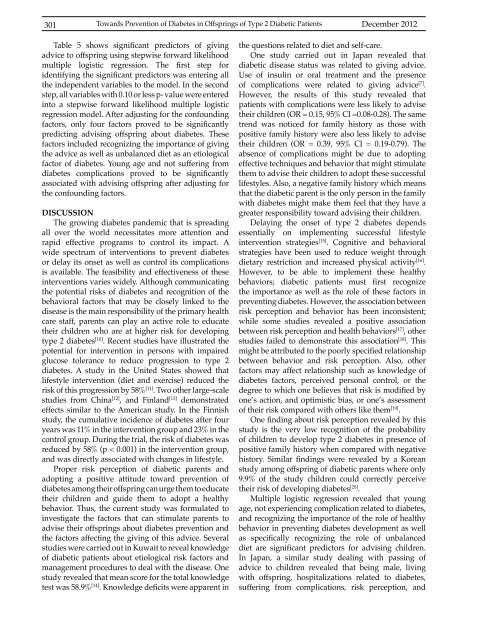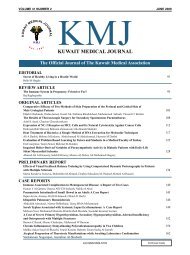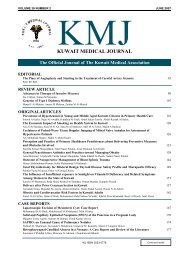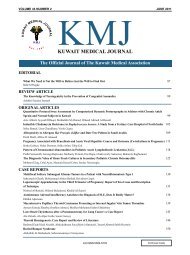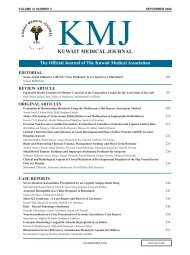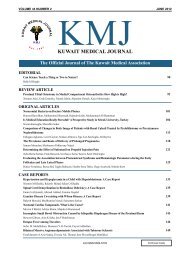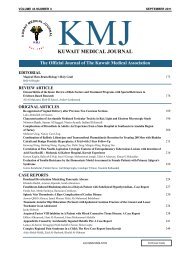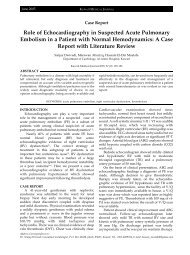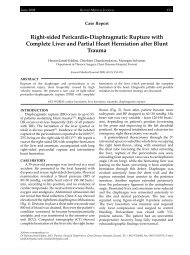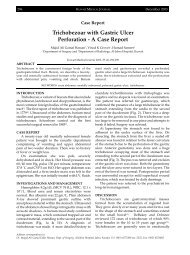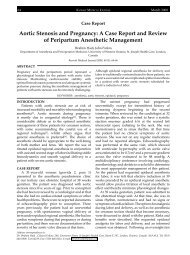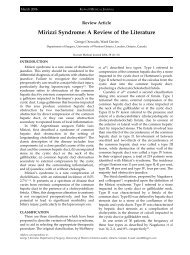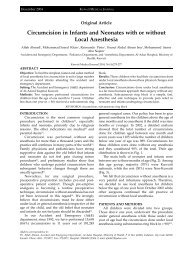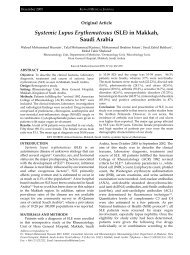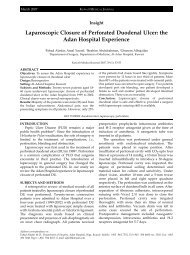Vol 44 # 4 December 2012 - Kma.org.kw
Vol 44 # 4 December 2012 - Kma.org.kw
Vol 44 # 4 December 2012 - Kma.org.kw
Create successful ePaper yourself
Turn your PDF publications into a flip-book with our unique Google optimized e-Paper software.
301<br />
Towards Prevention of Diabetes in Offsprings of Type 2 Diabetic Patients<br />
<strong>December</strong> <strong>2012</strong><br />
Table 5 shows significant predictors of giving<br />
advice to offspring using stepwise forward likelihood<br />
multiple logistic regression. The first step for<br />
identifying the significant predictors was entering all<br />
the independent variables to the model. In the second<br />
step, all variables with 0.10 or less p- value were entered<br />
into a stepwise forward likelihood multiple logistic<br />
regression model. After adjusting for the confounding<br />
factors, only four factors proved to be significantly<br />
predicting advising offspring about diabetes. These<br />
factors included recognizing the importance of giving<br />
the advice as well as unbalanced diet as an etiological<br />
factor of diabetes. Young age and not suffering from<br />
diabetes complications proved to be significantly<br />
associated with advising offspring after adjusting for<br />
the confounding factors.<br />
DISCUSSION<br />
The growing diabetes pandemic that is spreading<br />
all over the world necessitates more attention and<br />
rapid effective programs to control its impact. A<br />
wide spectrum of interventions to prevent diabetes<br />
or delay its onset as well as control its complications<br />
is available. The feasibility and effectiveness of these<br />
interventions varies widely. Although communicating<br />
the potential risks of diabetes and recognition of the<br />
behavioral factors that may be closely linked to the<br />
disease is the main responsibility of the primary health<br />
care staff, parents can play an active role to educate<br />
their children who are at higher risk for developing<br />
type 2 diabetes [10] . Recent studies have illustrated the<br />
potential for intervention in persons with impaired<br />
glucose tolerance to reduce progression to type 2<br />
diabetes. A study in the United States showed that<br />
lifestyle intervention (diet and exercise) reduced the<br />
risk of this progression by 58% [11] . Two other large-scale<br />
studies from China [12] , and Finland [13] demonstrated<br />
effects similar to the American study. In the Finnish<br />
study, the cumulative incidence of diabetes after four<br />
years was 11% in the intervention group and 23% in the<br />
control group. During the trial, the risk of diabetes was<br />
reduced by 58% (p < 0.001) in the intervention group,<br />
and was directly associated with changes in lifestyle.<br />
Proper risk perception of diabetic parents and<br />
adopting a positive attitude toward prevention of<br />
diabetes among their offspring can urge them to educate<br />
their children and guide them to adopt a healthy<br />
behavior. Thus, the current study was formulated to<br />
investigate the factors that can stimulate parents to<br />
advise their offsprings about diabetes prevention and<br />
the factors affecting the giving of this advice. Several<br />
studies were carried out in Kuwait to reveal knowledge<br />
of diabetic patients about etiological risk factors and<br />
management procedures to deal with the disease. One<br />
study revealed that mean score for the total knowledge<br />
test was 58.9% [14] . Knowledge deficits were apparent in<br />
the questions related to diet and self-care.<br />
One study carried out in Japan revealed that<br />
diabetic disease status was related to giving advice.<br />
Use of insulin or oral treatment and the presence<br />
of complications were related to giving advice [7] .<br />
However, the results of this study revealed that<br />
patients with complications were less likely to advise<br />
their children (OR = 0.15, 95% CI =0.08-0.28). The same<br />
trend was noticed for family history as those with<br />
positive family history were also less likely to advise<br />
their children (OR = 0.39, 95% CI = 0.19-0.79). The<br />
absence of complications might be due to adopting<br />
effective techniques and behavior that might stimulate<br />
them to advise their children to adopt these successful<br />
lifestyles. Also, a negative family history which means<br />
that the diabetic parent is the only person in the family<br />
with diabetes might make them feel that they have a<br />
greater responsibility toward advising their children.<br />
Delaying the onset of type 2 diabetes depends<br />
essentially on implementing successful lifestyle<br />
intervention strategies [15] . Cognitive and behavioral<br />
strategies have been used to reduce weight through<br />
dietary restriction and increased physical activity [16] .<br />
However, to be able to implement these healthy<br />
behaviors; diabetic patients must first recognize<br />
the importance as well as the role of these factors in<br />
preventing diabetes. However, the association between<br />
risk perception and behavior has been inconsistent;<br />
while some studies revealed a positive association<br />
between risk perception and health behaviors [17] , other<br />
studies failed to demonstrate this association [18] . This<br />
might be attributed to the poorly specified relationship<br />
between behavior and risk perception. Also, other<br />
factors may affect relationship such as knowledge of<br />
diabetes factors, perceived personal control, or the<br />
degree to which one believes that risk is modified by<br />
one’s action, and optimistic bias, or one’s assessment<br />
of their risk compared with others like them [19] .<br />
One finding about risk perception revealed by this<br />
study is the very low recognition of the probability<br />
of children to develop type 2 diabetes in presence of<br />
positive family history when compared with negative<br />
history. Similar findings were revealed by a Korean<br />
study among offspring of diabetic parents where only<br />
9.9% of the study children could correctly perceive<br />
their risk of developing diabetes [20] .<br />
Multiple logistic regression revealed that young<br />
age, not experiencing complication related to diabetes,<br />
and recognizing the importance of the role of healthy<br />
behavior in preventing diabetes development as well<br />
as specifically recognizing the role of unbalanced<br />
diet are significant predictors for advising children.<br />
In Japan, a similar study dealing with passing of<br />
advice to children revealed that being male, living<br />
with offspring, hospitalizations related to diabetes,<br />
suffering from complications, risk perception, and


